| Environment COP21: Climate Wars
|
|||||
The nations of the world are in the midst of a different kind of war. It is not a battle over territorial space; it is a war for atmospheric space, a share of the carbon budget, for the right to develop, for equity and fairness when right to luxury is pitted against the right to survive. |
Environment | ||||
 Nations are preparing for the crucial climate summit, COP21 in Paris. Centre for Science and Environment (CSE) at its media briefing on Climate Change on 5th and 6th November attended by 100 journalists from India, South Asia and Africa appealed for fair and equitable negotiations, so that developing countries meet their development needs while the world contains global warming.
Nations are preparing for the crucial climate summit, COP21 in Paris. Centre for Science and Environment (CSE) at its media briefing on Climate Change on 5th and 6th November attended by 100 journalists from India, South Asia and Africa appealed for fair and equitable negotiations, so that developing countries meet their development needs while the world contains global warming. To understand the implications and the gravity of the situation, consider the following:
Between 1880 and 2012, the temperature increase has been 0.85 degrees, and we are already witnessing devastating impact on vulnerable eco-systems, like the Himalayas and coastal regions. The poorest who are not responsible for climate change are worst impacted. The development dividend of the developing countries is being lost because of the changes in weather. Sunita Narain, Director General, CSE said, "Climate change is not something that is 'going to happen'. It is happening. We are victims of climate change. Farmers are being hit by unseasonal rains, hailstorms have devastated ready crops. Everywhere we are seeing the face of despair. I have been at places where I have seen half the years rainfall come down in 5 hours, in FIVE HOURS. It is happening because of the greenhouse effect."
Narain says, "At Rio in 1992, it was the age of innocence when we believed strongly we could change the way the world, produced, consumed and emitted. Yet, today, as we go to Paris, the world is still finding excuses not to act, not to bridge the gigaton gap. The reason is because economies are on the line. Energy is at the core of the climate change debate because the world is still addicted to fossil fuels. Growth has to be reinvented. The energy basket has to be changed from fossil to non-fossil. Consumption has to be drastically reduced."
Climate negotiations are about the carbon budget, how much the world can emit to stay within the 2 degrees rise in temperature. Who will occupy the remaining space of the carbon budget? Climate change is about the fact that the world has already emitted, leading to temperature increase. We have one atmospheric space, we live on one planet, we have to reduce emissions to share the pain of impact of climate change so that growth, which is linked to emissions, has to be shared across the world. Right to global atmospheric space is right to development. It is not the right to pollute. The developing countries need to secure their right to development. The historical burden of countries which is the natural debt of a country, like a financial debt, has to be paid.
Between 1850 and 2011, 5% of the world's population was responsible for 21% of emissions. The burden of its emissions must be shouldered by the USA, despite its political rhetoric. With per capita emissions of CO2 of over 17 tonnes, USA is rivaled by Australia at 19t and Canada at 16t. China, the biggest annual emitter today, is responsible for cumulative emissions of 11 % and per capita emissions of 7t. The European Union is responsible for over 18% of cumulative emissions and per capita emissions equal to China. India, the fourth highest annual emitter today, is responsible for 3% of total emissions with per capita emissions of 1.6t, among the lowest world-wide. All of Africa taken together has cumulative emissions of just over 3 % with per capita emissions equaling India. One of the environmental stories the Western world would like to erase is the inconvenient truth of the historical context. These inequities need to be addressed.
At less than 1 degree global warming, there is a moderate impact on unique and vulnerable eco-systems like Sundarbans and Himalayas, that we are already witnessing. At 2 degrees, we will be having huge impact on these threatened eco-systems and we will see large scale singular events, extreme weather events, global singular events. We have documented data on reduction in snow cover, shrinking glaciers in Himalayas, increased sea-level, ocean acidification, and biological sciences are reporting 'adaptation' of animals and plants. Data from insurance companies show average extreme weather events of 2.5 per year per decade in early part of past 100 years, and in the decade of 2000-2010 comparative figures are 350 extreme weather events per year. Some events of the past decade that are still fresh in our minds are the 1000 mm of rainfall in 24 hours in 2005 that left 5000 people dead in Mumbai. In 2010, in a cloudburst within 30 minutes we had over 200 mm rain in Leh, which is equal to the annual rainfall there. In 2013, in Uttarakhand we had 350 mm rainfall in 24 hours and 6000 people were dead. There is an increase of intense rainfall events and a marked decrease in moderate rainfall events, which is is needed for agriculture.
TThe world is already looking at the prospect of not containing global warming within 2 degrees Celsius. "Emissions don't peak, growth in emissions reduce. Emissions in 2030 is 25% higher than is needed to stay within 2 degrees," said Bhushan, about the INDC's submitted by different countries. Speaking about the 25% 'ambition gap' until 2030, he said that much of Africa and India will not have met their development needs by 2030. He also pointed out that food, clothes, everything causes carbon emissions, but by 2030-35, the carbon budget will be over. Mark Hertsgaard said in The Nation: "At the popular level, there is unprecedented organization, mobilization, and support for tackling the crisis; a genuine mass movement, which first emerged at the ill-fated Copenhagen summit in 2009, has come of age. And at the elite level, there is unprecedented consensus that the situation is truly grave and that meaningful action must be taken if our children are not to inherit a hell on earth. Every individual needs to be aware that he lives on Planet Earth, and his home is now threatened. It is time to become aware of the issues, to join hands and to act.
Additional Resources
Annual Media Briefing on Climate Change for Journalists of Global South
|
|||||
Editor: Romola Butalia (c) India Travelogue. All rights reserved. |
|||||
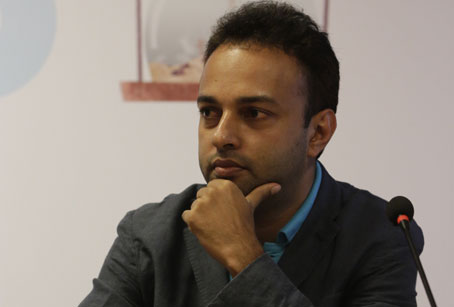 The frequency of droughts has been increasing, as stated by Roxy Mathew Koll of Indian Institute of Tropical Meteorology, Pune. Both 2014 and 2015 have been drought years in India. Five of the past fifteen years have been drought years. South Asian monsoon during the past half-century shows a weakening trend, and central India has had a significant reduction in rainfall with increased extreme rainfall events. Frequency of extreme events have increased and the Indian Ocean is warming. Koll says, "Extreme events (rainfall/rainstorms, temperature, tropical cyclones) are set to increase." Natural catastrophes have been increasing world-wide with an upward trend as seen in data from 1980.
The frequency of droughts has been increasing, as stated by Roxy Mathew Koll of Indian Institute of Tropical Meteorology, Pune. Both 2014 and 2015 have been drought years in India. Five of the past fifteen years have been drought years. South Asian monsoon during the past half-century shows a weakening trend, and central India has had a significant reduction in rainfall with increased extreme rainfall events. Frequency of extreme events have increased and the Indian Ocean is warming. Koll says, "Extreme events (rainfall/rainstorms, temperature, tropical cyclones) are set to increase." Natural catastrophes have been increasing world-wide with an upward trend as seen in data from 1980. 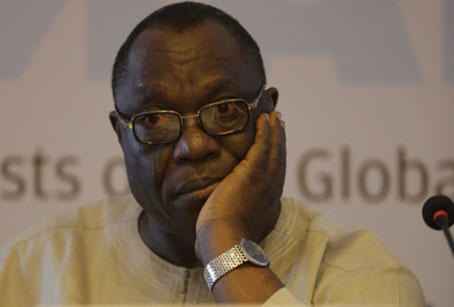 Regarding the U.S., she commented, "U.S. consumption is out of control. U.S. lifestyle has to be negotiable. U.S. Governments entire approach has been to improve efficiency which has meant they drive more, they build bigger buildings, and emissions continue to rise. The world cannot come to Paris saying we have managed to save the world, we have not." The truth is that the world cannot afford to follow the American consumption model, the American dream that has hypnotized much of the world and caused us, in India, to forget the wisdom of traditions that have survived thousands of years, to replace them with an aspirational, non-sustainable lifestyle.
Regarding the U.S., she commented, "U.S. consumption is out of control. U.S. lifestyle has to be negotiable. U.S. Governments entire approach has been to improve efficiency which has meant they drive more, they build bigger buildings, and emissions continue to rise. The world cannot come to Paris saying we have managed to save the world, we have not." The truth is that the world cannot afford to follow the American consumption model, the American dream that has hypnotized much of the world and caused us, in India, to forget the wisdom of traditions that have survived thousands of years, to replace them with an aspirational, non-sustainable lifestyle. 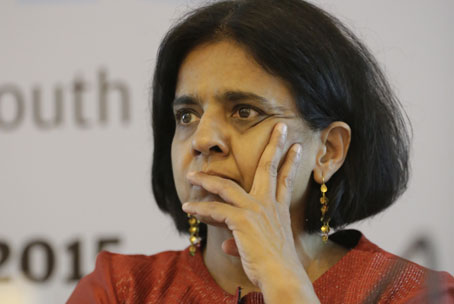 At Rio, it was about creating ecological space. At Paris, the attempt is to freeze inequities. Who is emitting how much? Annual emissions are not what should be taken into account. We need to consider what has been emitted cumulatively, because temperature rise is because of concentration of gases in the atmosphere with carbon dioxide, a long-life gas, the main culprit.
At Rio, it was about creating ecological space. At Paris, the attempt is to freeze inequities. Who is emitting how much? Annual emissions are not what should be taken into account. We need to consider what has been emitted cumulatively, because temperature rise is because of concentration of gases in the atmosphere with carbon dioxide, a long-life gas, the main culprit. 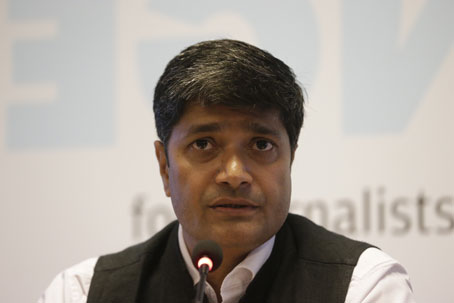 The Fifth assessment report of IPCC, shows that there is a mathematical equation linking cumulative emissions to temperature. What our emissions will be from now is not the only thing to be considered, what we have emitted already has to be taken into account.
The Fifth assessment report of IPCC, shows that there is a mathematical equation linking cumulative emissions to temperature. What our emissions will be from now is not the only thing to be considered, what we have emitted already has to be taken into account. 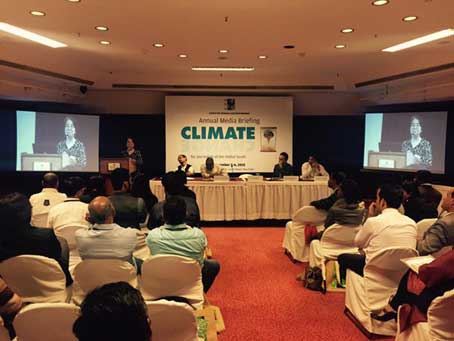 Poor countries and communities are being affected more than richer developed countries. "Even if we become net zero emitters, which will not happen", says Chandra Bhushan, the CSE's deputy director general, "temperatures will increase by 0.3 to 0.7 degrees between 2016-2035, which means global warming between 1.2 to 1.5 degrees." In reality, we are adding greenhouse gases at a more rapid rate than ever. Carbon dioxide remains for 1000 years in the atmosphere, 80% remains between 100-150 years. Global warming potential of refrigerants are 2200 times that, while other polluters are even more damaging.
Poor countries and communities are being affected more than richer developed countries. "Even if we become net zero emitters, which will not happen", says Chandra Bhushan, the CSE's deputy director general, "temperatures will increase by 0.3 to 0.7 degrees between 2016-2035, which means global warming between 1.2 to 1.5 degrees." In reality, we are adding greenhouse gases at a more rapid rate than ever. Carbon dioxide remains for 1000 years in the atmosphere, 80% remains between 100-150 years. Global warming potential of refrigerants are 2200 times that, while other polluters are even more damaging.